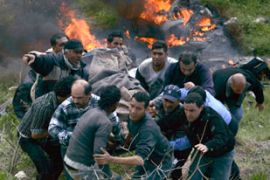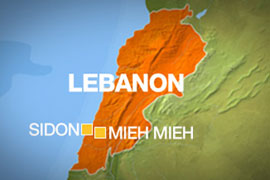UN condemns Lebanon killings
Ban Ki-Moon calls for calm after blast kills senior PLO official and three others.

Naji, two of his bodyguards and another Palestinian official were travelling in a convoy when a bomb exploded at the entrance of the Mieh Mieh camp near the coastal town of Sidon, a Lebanese army spokesman said.
Naji was deputy representative of the PLO in Lebanon and a former Fatah intelligence chief.
Al Jazeera’s Maryam Nemazee, reporting from the scene, said that the car Naji was travelling in was thrown down a hill and reduced to a charred wreck.
Television footage showed another vehicle plunged into a large crater created by the explosion.
Fatal visit
Fahmy al-Zaarir, the Fatah spokesman in the West Bank, said that Abbas Zaki, the PLO chief in Lebanon, was also visiting the camp at the time of the attack, but was uninjured.
| In depth |
|
|
Naji and Zaki had been giving condolences to the relatives of two Fatah officials who had been killed during a shooting in the camp on Saturday. The shooting has been blamed on a family dispute.
“There had been a feud between two families and we understand that a member of one of those families was wounded in the head,” Nemazee reported.
“That led to violent demonstrations in which the two members of Fatah were killed.”
Munir Maqdah, who is in charge of security at the Mieh Mieh camp, told Al Jazeera that the clashes had nothing to do with Naji’s assassination.
“Naji had sent messages to the Lebanese justice authorities telling them about some groups who were seeking to assassinate him.
“Maybe a third party had taken advantage of those messages, then got involved to create inter-Palestinian sedition and chaos.”
Israel blamed
Meanwhile Edward Kattoura, a Fatah member in Lebanon, told Al Jazeera that Israel could be behind the killing.
|
“According to the style of the operation it seems that Israel is behind this, because it is a very highly professional execution” Edward Kattoura, |
“According to the style of the operation it seems that Israel is behind this, because it is a very highly professional execution,” he said.
“We don’t think the execution is related to the Palestinian problem as it is targeting the stable situation in Lebanon and in the Palestinian camps.”
Mieh Mieh, which was established in 1954, is a small camp with about 5,000 registered refugees, the UN Relief and Works Agency (Unrwa) says.
Al Jazeera’s Rula Amin, reporting from the Lebanese capital Beirut, said: “It is one of the camps that has the presence of all the Palestinian factions and the assassination comes at a time that is very volatile to the Palestinians, especially with the split between the Fatah faction and Hamas.”
She said it would be hard to say why Naji had been targeted until it became clear who had carried out the attack, but that he was not considered to be a “polarising personality”.
Unity talks
Several rounds of Egyptian-mediated talks between Fatah and Hamas broke down last week without a deal on a national unity government.
 |
But Osama Hamdan, a Hamas representative in Lebanon, said Naji had played a role in helping to ease tensions among the Palestinian factions in the country and called the killing “a despicable crime”.
The office of Mahmoud Abbas, the Palestinian president and Fatah leader, issued a statement condemning the killing.
“President Abbas condemns the terrorist crime that targeted Major-General Kamal Naji,” the statement said. “He dedicated his life to serve his people and his cause.”
Sultan Abul-Einein, a senior Fatah commander in Lebanon, described Naji’s killing as a “tragedy”. He warned that it could be the beginning of a “cycle” to target other Fatah officials in Lebanon.
About 1.3 million Palestinian refugees who fled their homes during the 1948 Arab-Israeli war and subsequent conflicts, live in 58 refugee camps in Lebanon, Jordan, Syria, the West Bank and Gaza Strip.

 Profile: Kamal Naji
Profile: Kamal Naji